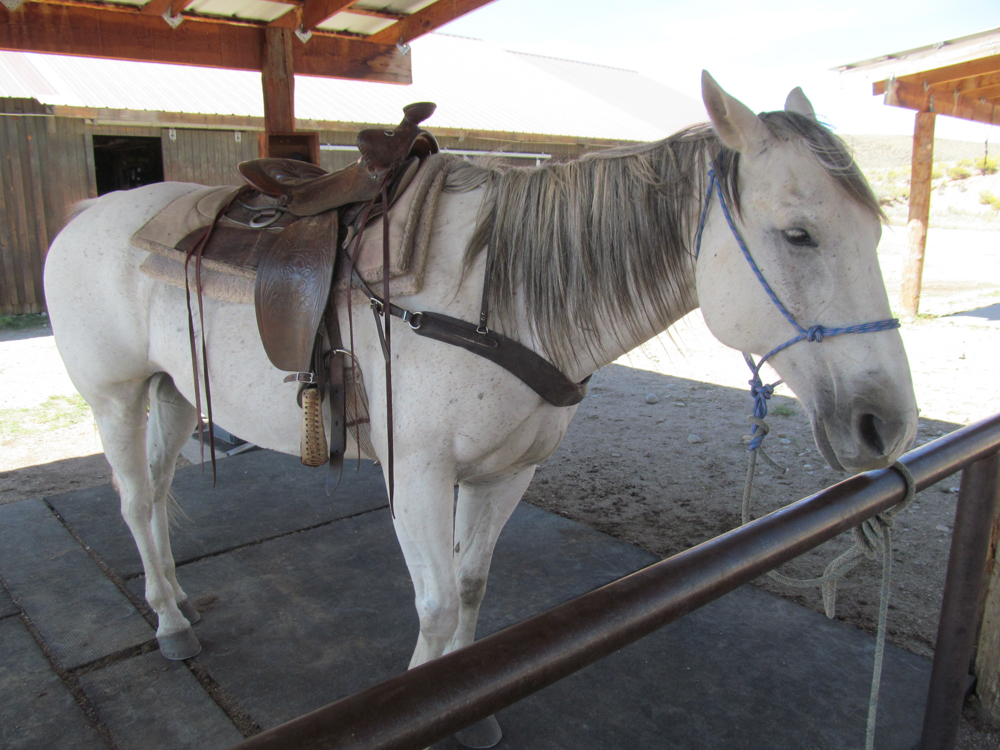I lost Luke twice. He was my first love. I remember the tears rolling down my cheek as I wrapped my arms around him. I buried my face into his neck, into his face. I was ashamed to cry; I don’t think Luke noticed. Like most summer romances, it was a short love affair, one that grew, like so many others, as we spent time in the mountains. It was also, no doubt, one-sided. I talked all day long as we traveled the trail together. Luke was reticent though; he didn’t say much.
I came out of the mountains that late summer interested in working with horses on NOLS courses. At the time, the physical work and the culture appealed to me; they still do. That wasn’t surprising. I found the relationship that I developed with Luke to be one that surprised me. I underestimated the power of the horse/human connection. At the start, when I first walked into the coral to find Luke I never would have imagined getting teary eyed over leaving him and the ranch at the end of the course. Then ten days later, walking up the hill to find him at the head of Monument Creek, leading him down through tall, dry ochre, grasses, with dusk spreading over the hills, I took a slow look back. I felt tears well in my eyes. Instinctively I had one of my “talks” with Luke. My pack partner, Bonnie, said that she would spend hours laughing at the conversations I had with Luke.
In the beginning, Jim (one of the human instructors on the seminar) and I walked into the corral to find Luke. Maybe it was my first official time in the corral, maybe not. “Which one is Luke?” I asked. “I often tell Luke by which one he is not” was the reply. “He’s one of the grey horses.” That rules out most of the herd, I thought. I immediately ruled out the paints and bays and black and brown ones. I follow Jim as he honed in on a few dirty white horses, walking around looking at them from different angles. “Nope, that’s Lucy” and “that’s Ernie” he continued as we moved cautiously through the herd. “So it’s a white horse?” I ask, as TSwift’s song started running through my head. “I suppose” Jim responded, “but we call’em grey.” Two days later I still couldn’t tell Luke from the herd. I had to flag down a ranch employee passing by for help “ha, sometimes I have a hard time with him too” she says as we scan the heard. Even when we got out to the field and the number of “grey” horses is reduced to four, but really three cause Ralph is unmistakable, I still sometimes had to wait for Jim to claim Mike and Maddie to claim Ernie. I seem to learn students’ names quicker. Luke had a grey nose. Ernie’s wasn’t, it’s more pinkish. Luke also had some sort of smiley face and has no response to the questions I ask him…Ernie might not have either, but I don’t think I’ve ever asked him any questions.

Then, in February of 2017, I found this email in my inbox:
Hello everyone –
I am sad to share with you that we recently lost one of our herd, Luke. He passed away out at winter pasture. It appears that he simply lay down and died peacefully.
Luke first came to Three Peaks in 2006 as a 5 year old. During the time since, he likely went out on over 25 courses, and countless rerations. He was known for his calm, reliable sensibility. His presence in the herd will be missed.
I have a funny story I’d like share of one of my first memories of Luke. In my first year as a horsepacker, I rode Luke out on a re-ration. I was pretty sick at the time, but insisted that I was okay to ride. I realized fairly early on into the ride that I actually wasn’t capable of much more than just sitting and holding on, and I was grateful to be riding Luke, who I knew would take care of me. He, of course, was excellent at this. Even when it started raining and we stopped to put our slickers on. In my sick delirium, I forgot to tie my saddlebags on properly, so at some later point, they slipped off the saddle. Luke was completely unfazed by this, and never reacted to the saddlebags falling off him, and thus, they were lost forever…
Please be in touch if you have any questions, or other Luke stories you would like to share.
Best,
Kelsey
The loss of a horse is never easy. They aren’t pets, they aren’t co-workers; they are friends and confidants. These horses are stubborn and easy. They have had tears cried into their necks and held onto confessions and secrets. They have kicked hard and caused tears, hospital visits, and have tossed away trust. They are complex, amazing creatures, capable of so much: intelligent, friendly, loving, curious, playful, and the list goes on. And, as Kelsey noted, they take care of us. The Three Peaks horses are good at their jobs. They take care of us by making things easier for us (until they don’t). They are reliable and consistent (until they aren’t). But by and large, as instructors, we know our students are in “good hands.” Novices (and sometimes non-novices too) astride horses do unexpected things and somehow the horses deal with it non-chalantly (usually). I can think of times I didn’t know any better. I rode Luke into the rocky bottomed Pole Creek crossing. The exit on the northwest side was fraught with boulders and water and uncertain ground. I waded Luke in and then kept walking. Even with three horses in tow, somehow we walked out the other side of the gauntlet without incident. Ignorance is bliss, I just trusted Luke to walk through the water and that he knew how to do that. In so many ways I still trust the horses to do the things they do—it would be hard to do the job if I didn’t—but I am more acutely aware of the hazards now. After the crossing, our other human instructor, Jesse, told me about some of the objective hazards in that particular style of crossing—I still don’t look at that crossing the same.
I probably dismounted Luke for the last time up at Elkhart Park. The speed at which I rode him out of the mountains had little to do with my desire to leave. We rose early and plodded westward from Monument Creek; yellow, frost tinged willow leaves and bugling elk offering their goodbyes. Cummins’ stubbornness and anchor like mentality that cold September morning was much more similar to what I wanted to experience. Luke had taken care of me. I didn’t know shit when I mounted Luke for the first time and when I dismounted him for the last time, not much had changed. Sure there were the numerous other beings out there that showed me support and love, but Luke introduced me to The Magic.
In the intervening years, I worked a horse course and spent a few days at Three Peaks, but never got back on Luke. He was a stalwart that was always there, unassuming, and predictable. He, like Cummins or Ernie or Willy Wonka were horses you were always excited to see on your “Horse List.” Luke had carved a place into my heart; I didn’t need to ride him to feel him and have one of our talks. He had sewn the seeds and pulled me in.
And I still couldn’t find him amongst the herd.
Author’s Note: This piece has been sitting in my folder of half written pieces for a while. The recent loss of two horses, Notch (an unflappable paint who was also out with us on that formative seminar) and Bridger (loved because of his intelligence and athleticism, neither of which ever outshone his wild, mustang heart) prompted me to revisit this piece on Luke.
Featured Image: willow fringed meadow in the evening light, somewhere in the Middle Wind Rivers (traditional and present Lands of the Crow, Eastern Shoshone, Cheyenne, and Arapaho Peoples and others).

A fine peice Jared…your writing takes us with you on your journeys.